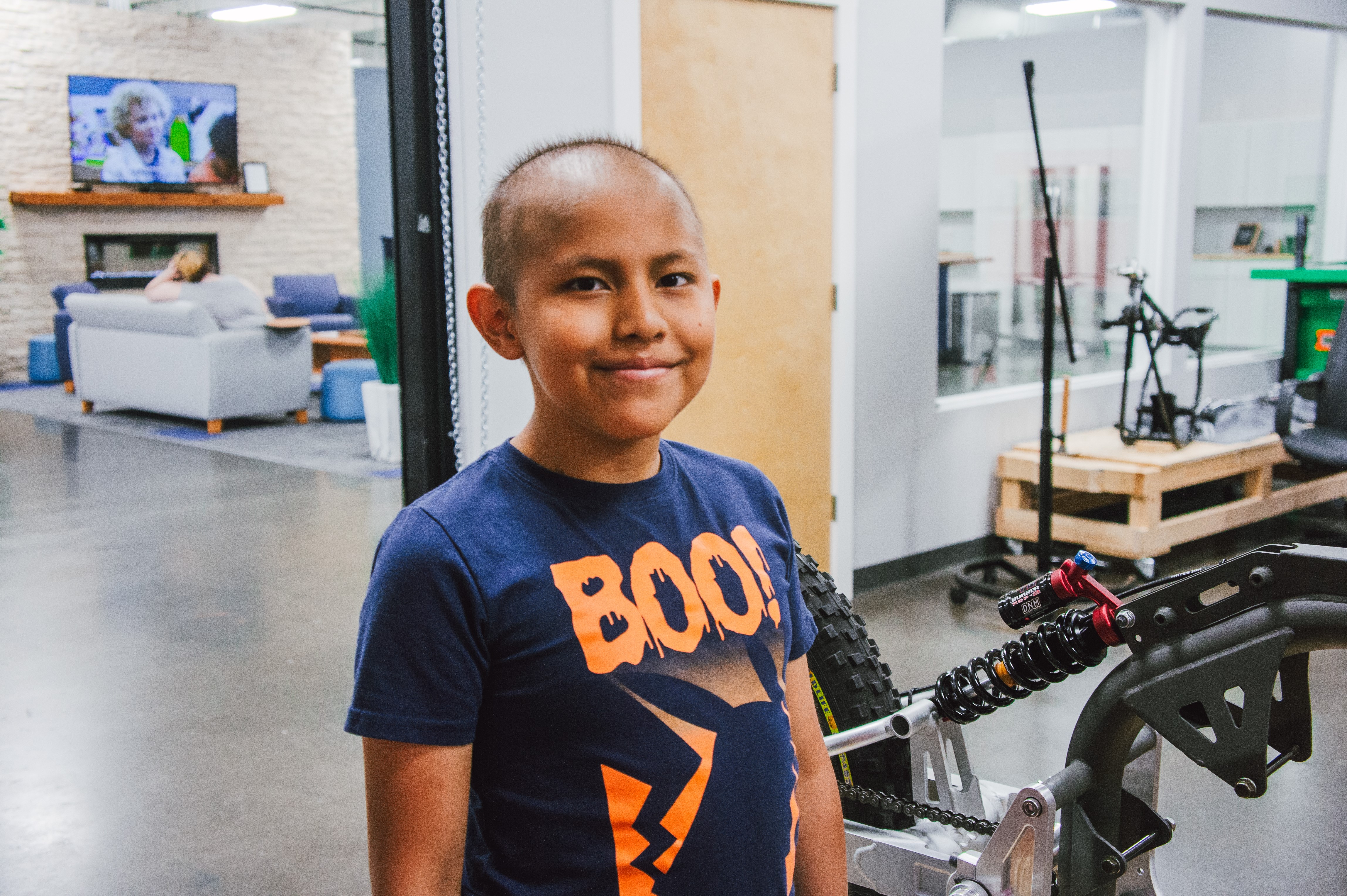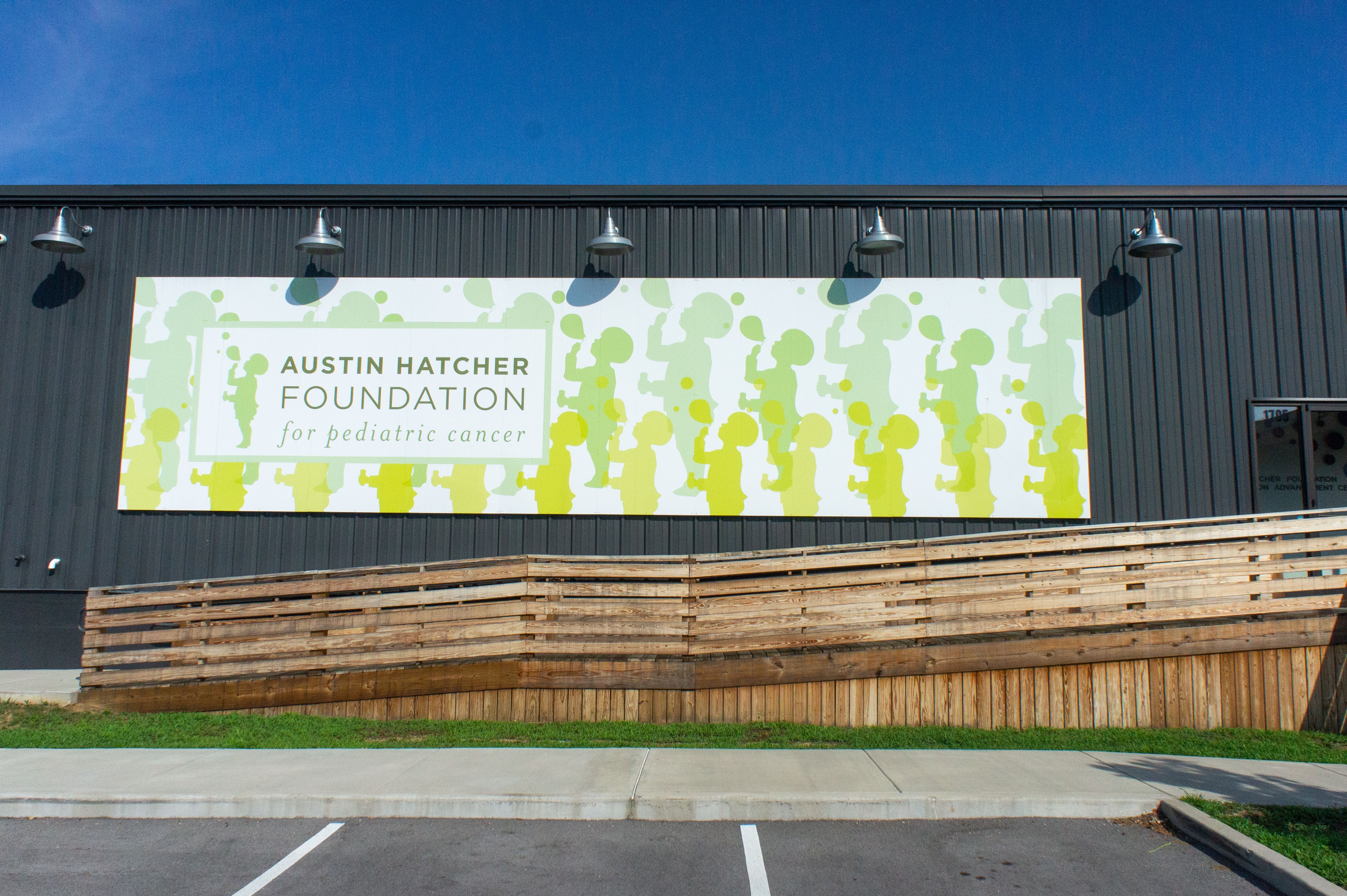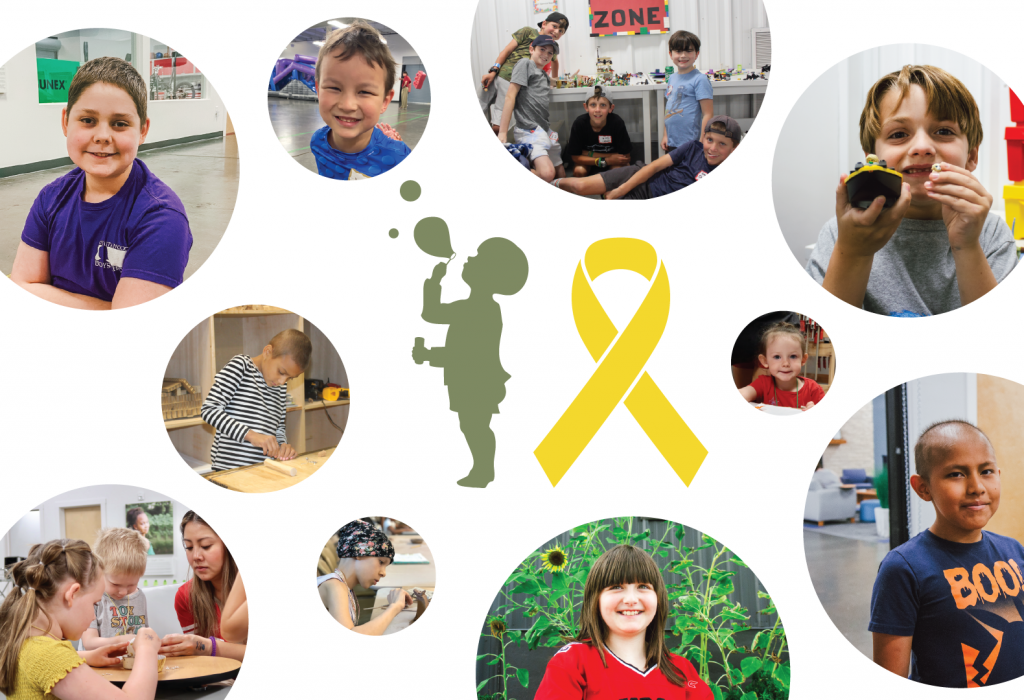
Austin Hatcher Foundation Helps Families Thrive while Living with Pediatric Cancer
The Austin Hatcher Foundation for Pediatric Cancer (AHF) was born in the wake of one family’s grief as a meaningful way to remember an infant son lost to cancer. The foundation’s one-of-a-kind pediatric cancer center is laser-focused on the psychosocial and cognitive effects of cancer on child sufferers and their families. Those of us on the outside looking in, may not know that cancer treatments, and cancer itself, can cause deficits that impact learning. Such deficits may affect a child’s academic work even years after cancer is only, hopefully, but a memory.
The Austin Hatcher Foundation can evaluate children and offer them therapies that can improve academic performance. But AHF, our latest small grant recipient, is also holistic, providing far more than testing and help with cognitive issues. AHF offers counseling for the whole family, along with abundant recreational activities. That’s important, because when a child has cancer, the effects are felt by all those connected to them.
We put some questions to Austin Hatcher Foundation Marketing Coordinator Shayna Webb:
Kars4Kids: Can you tell us the story behind the Austin Hatcher Foundation for Pediatric Cancer? Who was Austin Hatcher and what was the impetus for establishing the foundation?
Shayna Webb: The Austin Hatcher Foundation for Pediatric Cancer was formed in December 2006 by Jim and Amy Jo Osborn. On October 19, 2006, Jim and Amy Jo’s son, Austin Hatcher (“Hatch”) Osborn, at 11 weeks old, took his last breath. Hatch was diagnosed only 11 days earlier with a very rare and aggressive form of brain and spinal tumors. Ironically, even prior to Hatch’s diagnosis, the Osborns had a passion for supporting children’s cancer organizations through the motorsports industry and Jim’s race team. With a clinical understanding, a business mindset, and a desire to keep Hatch’s name alive, Jim and Amy Jo formed the Austin Hatcher Foundation to fill the unmet service needs of children suffering from cancer and their families, from the moment the child is diagnosed and then throughout their lifetime, helping them to thrive while living with pediatric cancer.
The Foundation began with a vision and mission: Jim and Amy Jo fundraised to open the nation’s only psychosocial, evidence-based, “whatever-it-takes-for-families-to-thrive” pediatric cancer center.
Within 15 years, the Foundation has grown over 1600 percent and gradually moved from 2,500 square feet of office space beginning in 2009, to now 33,000 square feet. More than $4.7 million in services are provided annually to children with cancer and their families at no cost to them.

Kars4Kids: Aside from missing school for treatments and needing help to keep up with their studies, what other types of issues get in the way of academic success for pediatric cancer patients and survivors?
Shayna Webb: Academic success for pediatric cancer survivors is often impacted by what is commonly classified as “late effects” of treatment. These late effects are typically correlated with the medication that is required to treat the cancer. Specifically, chemotherapy has not only an impact during treatment (“chemo brain”), but also has an impact that sometimes does not surface until later. The cognitive impact which adversely impacts success in academics includes deficits in attention, working memory, short-term and long term memory, multitasking, flexible thinking, self-control, visual perceptual deficits, as well as anxiety. There is not a textbook example because the impact on pediatric cancer survivors varies, some survivors have little or no remaining deficits and some survivors have all of the symptoms. Often, as a result of the changes that are reported after treatment being so gradual, the individual may not realize that their symptoms are even a result of the cancer treatments. Survivors report that they lose confidence and have increased anxiety, which often results in decreased participation in academic endeavors and ultimately decreased opportunity to learn and excel as they did prior their cancer diagnosis.
Kars4Kids: Why do pediatric cancer patients and survivors experience cognitive dysfunction? What does this dysfunction look like?
Shayna Webb: Due to young age at diagnosis and associated treatments, the National Cancer Institute (NIH) reports that approximately 70% of pediatric cancer survivors suffer serious long-term effects. Similarly, 40% to 100% of all pediatric cancer survivors experience neuropsychological dysfunction due to the toxic nature of chemotherapy and radiation treatments. Caregivers are also impacted by the child’s disease through impacts on their work or job life and increased susceptibility to post-traumatic stress disorder, financial burdens, etc. Siblings often report increased feelings of anxiety, frustration, and isolation leading to behavioral and academic issues.
Some late effects from common treatments of pediatric cancer include slowed cognitive processing speed and reduced working memory function.
Kars4Kids: How have improved survival rates for pediatric cancer patients changed the way their families direct their energies?
Shayna Webb: Due to improved survival rates, families are now able to move through the treatment journey with more hope than ever. They can be focused on long-term planning for their child. For example, continued school participation (even if it is modified to homebound learning), future career and fertility or family planning is also something families engage in with their children. The Austin Hatcher Foundation helps families transition from being focused on the difficulties of the childhood cancer journey to those things they need to best support their burgeoning young adult, whose needs and resources are naturally evolving.
Kars4Kids: One of the services provided by the Austin Hatcher Foundation is neuropsychological testing. Can you give us an overview? What do these tests measure, exactly?
Shayna Webb: Neuropsychological testing is a comprehensive evaluation of the patient’s brain function or cognitive status by specific neurological domains. This combination of assessments and tests measures cognitive abilities such as IQ, attention, learning & memory, language, academic skills and psychosocial function. The testing provides a comprehensive, detailed assessment of a person’s ability to encode, process, store and express information. Interpreting the various test results allows strengths and weaknesses to be uncovered. From the evaluation done by AHF’s licensed psychologists and clinicians, recommendations are made for optimizing learning and functioning.
Kars4Kids: What types of therapies do you offer to help kids regain or improve function? How do they help?
Shayna Webb: The experience of childhood cancer goes beyond diagnosis and affects every family member differently. Each family needs unique solutions to the individual challenges they face.
The foundation’s Education Advancement Center houses a variety of evidence-based programs to address each child’s and family members’ needs, including:
- Neuropsychological Testing (explained in previous question)
- Behavioral Health: Assessment & Intervention (Individual, Trauma, Grief, Marriage and Family Counseling, CogMed, PCIT- Parent Child Interaction Therapy, Behavioral Modification and Career Counseling)
- Occupational Therapy (Improves Physical Abilities, Sensory Deficits, Visual Perceptual Skills, Independence, Developmental Delays and Cognitive Function)
- Art + Music Therapy (Enhance Emotional and Physical Function)
- Family Programming (Day Camps, Parent Events and Sibling Events)
- Sibling Support (One-On-One Counseling, Enrichment and More)
- Academic Support (IEP/504 Plan, Tutoring and Virtual Learning)
- Industrial Arts (Shop Class – Treat and improve behavioral, memory and learning deficits)
All of these programs are offered to families for free with the goal of helping them cope in the present and thrive in the future after a pediatric cancer diagnosis.
Kars4Kids: We’d love to hear about your STEAM club and pop-up activities. How does this work? Can you give us some examples of the activities you offer?
Shayna Webb: Diversionary therapy, or the use of recreation or play as an addition to treatment, is often used to treat families who are facing a childhood cancer diagnosis. One area of Diversionary Therapy that is explored here at AHF is STEAM activities! STEAM activities are provided for affected patients and their siblings as a part of their visit to AHF. Activities follow a theme and records are kept to ensure that visitors are following a curriculum and achieving mastery of standards. We also do quarterly STEAM Clubs, all with a different theme. For example, our current STEAM Club is all about engineering, with a focus on robotics. Our last STEAM Club was geology focused, and the kids got to do a variety of activities, including planting and maintaining a garden, a dirt lab, learning about the rock cycle, doing a volcano kit and more!
Kars4Kids: In addition to the aforementioned services, you also offer counseling to the families. What are some of the issues that affect the families? What helps them most?
Shayna Webb: At AHF, we have a full time Licensed Marriage and Family Therapist, Susan Latta, who has over 35 years of counseling experience, with a specialty in grief. She not only leads our grief groups and grief camps, but also does individual, marriage, and family counseling. She shares the following:
“Anytime that a parent (family) receives the news that their child has been diagnosed with a form of pediatric cancer, panic of the unknown typically sets in. For families, there are many unknowns which often create a sense of powerlessness and anxiety. Parents are now having to look at how to manage a child in the hospital in active treatment (sometimes staying months) and having to figure out how to care for their other kids. Other family members or friends may need to step in to help with the care of the siblings and help to run the house while a parent is staying at the hospital navigating all of the treatments and decisions that are needed to be made for their child diagnosed with cancer. Exhaustion and multiple other feelings of the unknown are often the result of such a diagnosis.
“In addition, there is often a strain with the siblings who are left at home as their routine has been disrupted; they are missing the parent at the hospital, as well as the sibling receiving treatment. Siblings often will share how they feel ‘forgotten’ because their brother or sister has cancer and there is a huge focus on their sibling with cancer and not on them. Mom and dad may miss some of their important school, sports or other events that they typically attended prior to the diagnosis. Normalizing and validating the multitude of feelings is so vital when this happens. Being aware of the strain for the parents as well as the kids at home and the child with the cancer diagnosis can be very helpful.
“For friends and family that would like to help, providing a meal (create a meal train for the family), cleaning the house, doing laundry, taking the siblings to their school events, creating some special times for the kids at home with an activity may all be helpful in showing the family that you care. Doing something for the family may help alleviate a small piece of the stress and strain on the parents as well as the kids at home. Another gift that you can give the family is to be available to listen and provide a safe place for them to talk if they desire. Ask the parent what they need. Being present and mindful of the stress and strain on this family is a huge gift to families in this situation.”
Kars4Kids: How did the pandemic affect your operations?
Shayna Webb: Initially, we went home and looked at how we were going to manage (as did the rest of the world), but our patients still needed help—so we started looking at opportunities to connect with patients. We began pursuing opportunities for therapy via telehealth, which offered virtual support to our clients. Family programming was very dynamic and provided resources to families by delivering activity packages to their home. The packages had art projects and engaging learning activities to help engage children during a difficult time. We hosted a virtual camp; we had guests who participated throughout the camp such as history teachers, fitness specialists, dance instructors, art instructors and more, to ensure that the camp was dynamic and provided positive and rewarding opportunities for our clients and their siblings.
We had just acquired the new 33,000 sq. ft. Holtzclaw location prior to the pandemic. Utilizing precautions, a small crew of us (led by Amy Jo) began the move in process. We assembled furniture, moved equipment from our previous location and even brainstormed about interventions all while maintaining social distancing. Once we had moved in, the large space we had acquired afforded us the opportunity to provide intervention while employing social distance and we began seeing patients in person. Of course many individuals were very concerned about bringing their children to a public location so we also continued to complete sessions via telehealth.
Although it was a very difficult season, we did realize that we could help families in more ways than we had ever considered; technology was definitely our friend. We continue to utilize our technology in more advantageous ways secondary to lessons learned during the pandemic. We now are able to maintain connections with families when they are in the hospital or during illness when they need a connection – we now can meet them where they are.
Kars4Kids: What’s next for the Austin Hatcher Foundation? Is expansion in your future? Are there other services you hope to someday offer?
Shayna Webb: We want to keep growing! The need for the Foundation’s services continues to grow as more and more people are made aware of the invaluable support AHF provides. Thus, the Foundation must continue to grow. One of AHF’s strategic priorities is Grow/Expand which focuses on growing our reach and impact and includes growing annual revenue to ensure short and long-term sustainability. We hope to expand into more cities, and grow our impact to help fulfill our vision: for every child diagnosed with cancer, and their family, to reach their full potential.